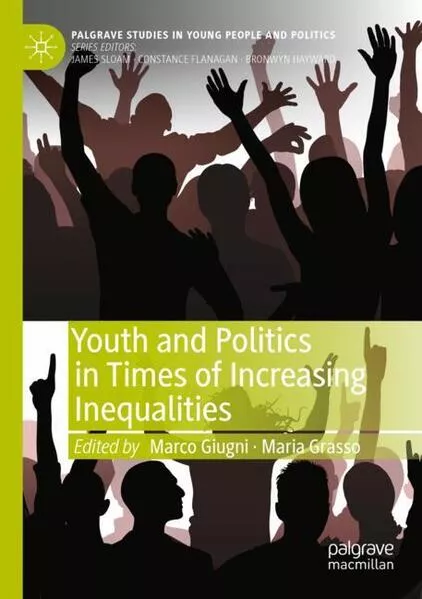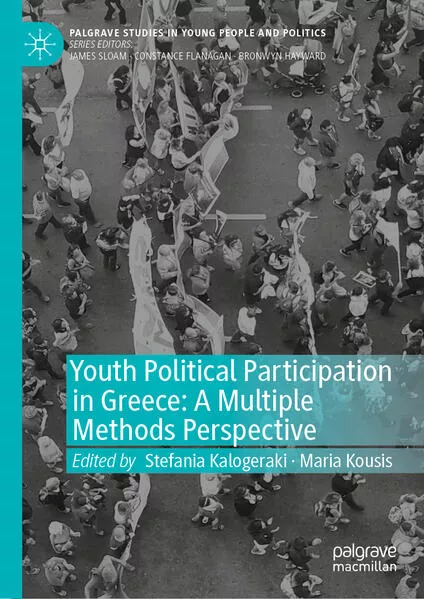Palgrave Studies in Young People and Politics
Youth and Politics in Times of Increasing Inequalities
Chronologie aller Bände (1 - 2)
Die Reihenfolge beginnt mit dem Buch "Youth and Politics in Times of Increasing Inequalities". Wer alle Bücher der Reihe nach lesen möchte, sollte mit diesem Band von Marco Giugni beginnen. Der zweite Teil der Reihe "Youth Political Participation in Greece: A Multiple Methods Perspective" ist am 24.10.2022 erschienen. Die Reihe umfasst derzeit 2 Bände. Der neueste Band trägt den Titel "Youth Political Participation in Greece: A Multiple Methods Perspective".
- Anzahl der Bewertungen für die gesamte Reihe: 0
- Ø Bewertung der Reihe: 0
- Start der Reihe: 25.07.2022
- Neueste Folge: 24.10.2023
Diese Reihenfolge enthält 2 unterschiedliche Autoren.
- Autor: Giugni, Marco
- Anzahl Bewertungen: 0
- Ø Bewertung:
- Medium: Buch
- Veröffentlicht: 25.07.2022
- Genre: Politik
Youth and Politics in Times of Increasing Inequalities
Young people are very often the driving forces of political participation that aims to change societies and political systems. Rather than being depoliticized, young people in different national contexts are giving rise to alternative politics. Drawing on original survey data collected in 2018, this edited volume provides a detailed analysis of youth participation in nine European countries by focusing on socialization processes, different modes of participation and the mobilization of youth politics.
"This volume is an indispensable guide to understanding young European’s experience and engagement of politics, the inequalities that shape young people’s political engagement and are sometimes replicated through them, and young people’s commitment to saving the environment and spreading democratic ideals. Based on compelling and extensive research across nine nations, this volume makes important advances in key debates on youth politics and provides critical empirical insights into which young people engage, influences on young people’s politics, how young people engage, why some young people don’t engage, and trends across nations. The volume succeeds in the herculean task of focusing on specific national contexts while also rendering a comprehensive picture of youth politics and inequality in Europe today."
—Jennifer Earl, Professor of Sociology, University of Arizona, USA
"Forecasts by social scientists of young people’s increasingly apathetic stance towards political participation appear to have been misplaced. This text, drawing data and analysis across and between nine European countries, captures the changing nature of political ‘activism’ by young people. It indicates how this is strongly nuanced by factors such as social class and gender identity. It also highlights important distinctions between young people’s approaches towards more traditional (electoral) and more contemporary (non-institutional) forms of participation. Critically, it illuminates the many ways in which youth political participation has evolved and transformed in recent years. Wider social circumstances and experiences are identified as highly significant in preparing young people for, and influencing their levels of participation in, both protest-oriented action and electoral politics."
—Howard Williamson, Professor of European Youth Policy, University of South Wales, UK
"This book is an incredible guide to understanding the role and sources of inequalities on young people’s political involvement. Country specific chapters allow the authors to integrate a large number of the key and most pressing issues regarding young people’s relationship to politics in a single volume. Topics range from social mobility and the influence of socioeconomic (parental) resources and class; young people’s practice in the social sphere; the intersection of gender with other sources of inequalities; online participation and its relationship with social inequalities; the impact of harsh economic conditions; the mobilization potential of the environmental cause; to the role of political organizations. Integrating all these pressing dimensions in a common framework and accompanying it with extensive novel empirical evidence is a great achievement and the result is a must read piece for researchers and practitioners aiming to understand the challenges young people face in developing their relationship to politics."
—Gema García-Albacete, Associate Professor of Political Science, University Carlos III Madrid, Spain
- Autor: Kalogeraki, Stefania
- Anzahl Bewertungen: 0
- Ø Bewertung:
- Medium: Buch
- Veröffentlicht: 24.10.2022
- Genre: Politik
Youth Political Participation in Greece: A Multiple Methods Perspective
The overarching aim of this edited volume is to investigate different modes, patterns and determinants of youth political participation in Greece, since the economic crisis, by incorporating a variety of quantitative and qualitative methods. The chapters examine different forms of youth political participation, from institutionalized (such as voting, or membership in political parties) to non-institutionalized (such as signing petitions, protesting through demonstrations or occupations, and political consumerism). Moreover, the chapters shed light on diverse aspects of youth political participation, such as the interlinkages between occupational precarity and political behaviour, the spatial portrait of youth political engagement in rural, suburban and urban Greek contexts, the engendered aspects of political involvement, the pivotal role of protest events in youth political socialization and in mobilization in contentious political actions, the different impacts of priming inequality on youth’s political beliefs, depending on different modes of thinking, as well as the key features of youth-related and youth-led (non-state) organisations operating in Greece. The aforementioned aspects are examined at the micro, meso or/and macro level through distinct methodological approaches including panel survey, experimental survey, biographical interviews, in-depth interviews and action organization analysis, carried out in the context of the EURYKA (European Commission) project.

